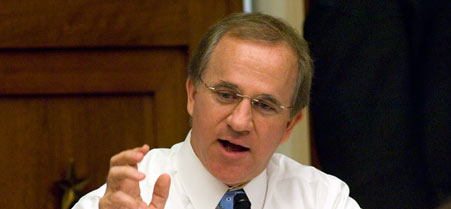VA says it has processed less than half of GI bill education benefits
With a claims backlog in the thousands, some student vets are concerned tuition and housing payments will arrive too late, forcing them to negotiate to stay in school.
 Rep. Steve Buyer said the VA should have asked Congress for additional resources.
Rep. Steve Buyer said the VA should have asked Congress for additional resources.
The Veterans Affairs Department said on Wednesday that it has processed less than half of the pending education benefits claims under the post 9/11 GI bill, and veteran groups expressed serious concerns students will not be able to pay their rent next month and colleges will need to wait for tuition payments.
The department has paid more than 61,000 benefits claims totaling $50 million since August, according to a statement . VA also said it processed 503,000 claims totaling $1 billion for other education benefit programs during the same period.
But VA told Nextgov that it still must process another 72,329 claims for post-9/11 GI bill benefits, with 60,071 eligibility determinations and 12,258 enrollment certifications. The department has a total of 172,662 education claims pending, which includes the new GI bill claims as well as other education programs.
VA said since May it has received 277,000 applications from veterans for certificates of eligibility or school enrollment certifications under the new GI bill, which greatly expanded the tuition and housing payments granted to veterans to pay for college under the old GI bill. VA said it has sent certificates to fewer than 200,000 veterans.
The Veterans Benefits Administration, in its latest weekly report , showed it had 268,083 items related to education benefits pending as of Sept. 21, down 11.3 percent from the previous week, but about four times the 64,700 items that were backed up a year ago. VA estimates 20 percent to 25 percent of the pending items are actual claims for education expenses and the remaining items involved other tasks, such as an inquiry about the status of a claim.
As of last week, VA had made 33,000 housing and stipend payments valued at $16 million and issued more than 20,000 payments to schools for tuition and fees for veterans under the post-9/11 GI bill.
The department's GI bill Web site reported the average processing time for claims -- including those under the new bill, the older Montgomery GI bill and other education programs -- averages 56 days. VA officials said it takes an average of 35 days to process post-9/11 GI bill claims, but added the processing time increased by an unspecified number of days when the fall semester began at colleges and universities.
"Our top priority is providing our students and schools with accurate and timely benefit payments so veterans can focus all of their energy on studies," said Patrick Dunne, undersecretary for benefits.
Despite the optimistic report, student veterans groups expressed concern that their checks would not be in the mail in time to cover tuition payments or housing expenses, as outlined in the GI bill .
Brian Hawthorne, who served two tours as an Army medic in Iraq and is the legislative director of Student Veterans of America, said he found it "heartening to see that the money is moving, and the extraordinary efforts that the VA is undertaking to ensure that student veterans are being paid."
But Hawthorne, a senior at The George Washington University, also expressed concern that some schools and veterans will not receive payments from VA in a timely fashion. Under the GI bill, VA pays tuition and fees to colleges and universities directly and sends a housing allowance and stipend, which runs about $1,900 a month in the District of Columbia, to veterans. The first housing checks for the fall semester are due next month. Summer school students should have received housing allowance checks for August in September.
Student Veterans of America continues to receive reports from veterans that they have not received payments for housing and from schools that they haven't received checks for tuition. "This is obviously a serious problem, but can also be expected with a new program," Hawthorne said.
Joe Davis, a spokesman for the Veterans for Foreign Wars, also continues to be concerned for veterans who have yet to receive their checks. "The VA is working very hard to meet the anticipated avalanche of claims, but the increase in claims processing time is having a negative impact on student veterans," he said.
Rep. Steve Buyer, R-Ind., and the ranking member of the House VA Committee, said in a statement, "The VA should have asked Congress for additional resources to ensure veterans and schools received their payments in a timely manner. Not once during the five oversight hearings held by the Economic Opportunity Subcommittee since passage of the new program did VA mention needing additional resources for implementation."
The Student Veterans of America has urged schools that have not received payments to allow veterans to remain in class. If veterans do not receive their housing allowance next month, the group has asked schools "to make emergency loans available so as to not disrupt the veteran's lifestyle, with the understanding that the full faith and credit of the U.S. government is behind these payments, and that the money will arrive," Hawthorne said.
While schools can afford to be more accommodating to student veterans, payments to "landlords, grocers, gas stations and other essential cost-of-living expenses don't stop," Davis said. "The VA has to do a better job of expediting claims processing and payments."
NEXT STORY: A Warm Farewell to Rob Kolodner






